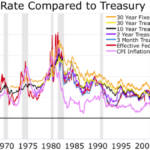Don’t let the tax bill ruin your high interest earnings
- Interest income from savings accounts and CDs is subject to income tax rates
- Taxpayers may owe an additional 3.8% investment tax on interest income
- Higher interest rates are leading to increased tax consequences for cash savers
- Tips for reducing taxable income include contributing to tax-advantaged accounts and taking capital losses
- Consider the location of assets to minimize tax consequences
- Retired taxpayers may be subject to underpayment penalties
- Remember to focus on how much you keep, not just how much you pay in taxes
As interest rates have climbed, more people have been drawn to cash as a way to earn higher yields. However, what many may not realize is the tax consequences that come with these high-yield savings accounts and CDs. Interest income from these accounts is subject to income tax rates, which can range from 10% to 37%. Additionally, taxpayers may owe an additional 3.8% investment tax on this income. To prepare for these tax consequences, it’s important to reduce taxable income by contributing to tax-advantaged accounts and taking capital losses. Consider the location of your assets to minimize tax consequences, and be aware of underpayment penalties for retirees who pay taxes through quarterly estimated payments. Finally, remember to focus on how much you keep, not just how much you pay in taxes. While the tax bill may be higher with high-yield savings accounts and CDs, you are still keeping a significant amount more than you would with lower interest rates.
Factuality Level: 7
Factuality Justification: The article provides information about the tax consequences of interest income and offers tips on how to reduce taxable income and make tax-efficient investments. The information is generally accurate and objective, but there are some statements that could be misleading or overly dramatic, such as the mention of a ‘coming tax bill’ and the use of terms like ‘tax sting’ and ‘tax sting.’ Overall, the article provides useful information but could benefit from a more balanced and neutral tone.
Noise Level: 4
Noise Justification: The article provides relevant information about the tax consequences of interest income and offers tips on how to reduce taxable income. However, it contains some repetitive information and lacks in-depth analysis or new insights.
Financial Relevance: Yes
Financial Markets Impacted: The article discusses the tax consequences of interest income, which can impact individuals, investors, and financial institutions.
Presence Of Extreme Event: No
Nature Of Extreme Event: No
Impact Rating Of The Extreme Event: No
Rating Justification: The article focuses on the financial implications of interest income and tax planning strategies, but does not mention any extreme events.
Public Companies: U.S. Bank (USB)
Private Companies: Armanino,KPMG,Vanguard
Key People: Kelly Gillette (Partner at Armanino), Arijit Roy (Head of Consumer Segment and Solutions at U.S. Bank), Robert Keller (Partner at KPMG), Joel Dickson (Global Head of Advice Methodology at Vanguard)
Reported publicly:
 www.marketwatch.com
www.marketwatch.com 





